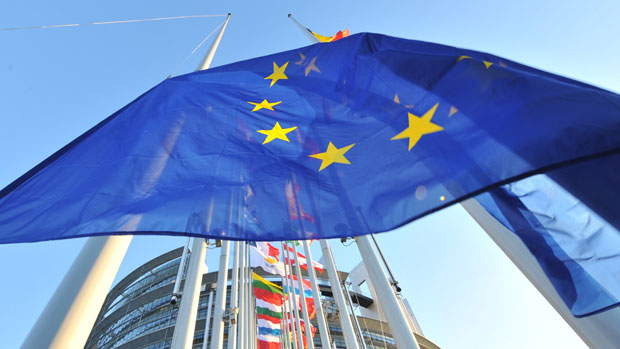What is the European Parliament and what does it do?
Next month’s elections could have profound implications for the future of the EU

A free daily email with the biggest news stories of the day – and the best features from TheWeek.com
You are now subscribed
Your newsletter sign-up was successful
This year’s European elections could have profound implications for the future of the European Union itself.
The European Parliament (EP) elections – taking place this year on 23 May – normally act as a kind of referendum on each member state’s domestic policies. But in this year’s vote, “the very idea of Europe is at stake”, says The New Yorker, as politicians “once sidelined as fringe extremists have moved into the mainstream”, adds Time magazine.
With Hungary, Poland and Italy now controlled by overtly anti-EU populist governments and growing support for Alternative for Germany (AFD), Marine Le Pen’s National Rally (formerly the National Front) and Geert Wilders’ Dutch Freedom Party, there is mounting concern that Eurosceptic parties are poised for significant growth in their representation at the EP.
The Week
Escape your echo chamber. Get the facts behind the news, plus analysis from multiple perspectives.

Sign up for The Week's Free Newsletters
From our morning news briefing to a weekly Good News Newsletter, get the best of The Week delivered directly to your inbox.
From our morning news briefing to a weekly Good News Newsletter, get the best of The Week delivered directly to your inbox.
Now that the UK looks likely to participate in May’s election, Nigel Farage’s Brexit Party is expected to do well, too. For as long as the UK remains a member of the EU, that would further swell Parliament’s populist numbers.
As power in the bloc’s parliament depends on the size of the group of parties you belong to, should they manage to consolidate, these parties “would be entitled to committee chairmanships and other posts with the power to shape legislation”, notes Bloomberg.
But how does the European Parliament work exactly and what do MEPs actually do?
How does the European Parliament work?
A free daily email with the biggest news stories of the day – and the best features from TheWeek.com
The EP is one of the four key EU institutions alongside the European Council, the Council of the European Union and the European Commission.
The EU’s 512 million people citizens are currently represented by 751 Members of the European Parliament (MEPs), including 73 from the UK.
Just like the UK, the EU has two chambers that must both approve legislation. The EP is the lower chamber and the Council of the European Union is the upper chamber.
MEPs in the EP are directly elected through European elections, while Council of the European Union representatives are appointed from each of the member state’s governments.
What does the EP do?
Legislation is proposed to the European Parliament by the European Commission, made up of one representative from each of the 28 member states. The president of the European Commission – currently Jean-Claude Juncker – is nominated by the European Council appointed by the European Parliament to serve a five-year term.
While most of the MEPs' work is done in Brussels in various committees on differing policy areas, every month the EP moves to Strasbourg for four days to take part in a plenary session, where votes are held on new legislation and decisions are made.
What are the main parties?
While most MEPs are members of a political party in their own country, most of them also opt to become part of EP groupings that have roughly the same values as their home party.
In total there are currently eight parliamentary groupings:
- European People's Party (EPP)
- Progressive Alliance of Socialists and Democrats (S&D)
- European Conservatives and Reformists (ECR)
- Alliance of Liberals and Democrats for Europe (ALDE)
- European United Left–Nordic Green Left (GUE-NGL)
- Greens–European Free Alliance (Greens–EFA)
- Europe of Freedom and Direct Democracy (EFDD)
- Europe of Nations and Freedom (ENF)
The centre-right EPP currently has the highest number of MEPs with 217, and is led by Angela Merkel’s German Christian Democrats. The EPP used to be the home of the UK Conservatives before they left to set up the more Eurosceptic group, the ECR.
Along with the centre-left socialist group, the S&D, the EPP “has traditionally been one of the two powerhouses of the Parliament, providing most of its presidents and vice-presidents”, says the BBC.
A Labour surge in the UK would help S&D keep their position as the second largest force in the parliament with 190 MEPs. But this time around the socialists “are projected to suffer heavy losses in big member states such as France, Italy and Germany”, says the Financial Times.
Among the largest opposition parties currently in the EP are ECR with 76 MEPs and the GUE with 52 MEPs. But the most recent polling shows two right-wing Eurosceptic groupings (the ENF and the EFDD) “could see their combined support climb”, says Deutsche Welle.
If they were to combine forces with the ECR, the largest bloc in the EP could be a Eurosceptic alliance. However, “while the populists have announced their intentions to form a new, consolidated alliance, in practice, splits and rivalries between the ECR, ENF and EFDD groups mean they are extremely unlikely to all join a single faction”, says The Independent.